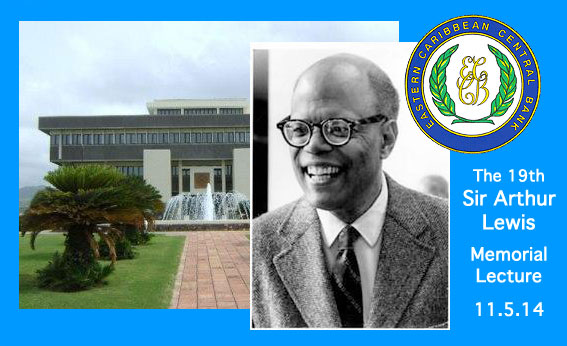 05 Nov 2014 (St. Kitts) — When the FT asked me a couple years ago for a piece that featured an influential thinker whose work shaped my professional life, I didn’t hesitate and wrote this article on Sir Arthur Lewis, the pioneering economist and Nobel Laureate from St. Lucia in the Caribbean. That article focused on business education and the good things that come from coupling serious scholarship and public engagement, research and practice. (For those who know me, this angle is no surprise: I try to bring “and” thinking with me wherever I go.)
05 Nov 2014 (St. Kitts) — When the FT asked me a couple years ago for a piece that featured an influential thinker whose work shaped my professional life, I didn’t hesitate and wrote this article on Sir Arthur Lewis, the pioneering economist and Nobel Laureate from St. Lucia in the Caribbean. That article focused on business education and the good things that come from coupling serious scholarship and public engagement, research and practice. (For those who know me, this angle is no surprise: I try to bring “and” thinking with me wherever I go.)
In addition to exemplifying a life of active thought leadership, Lewis’s intellectual fingerprints are all over the emerging market boom. He saw parallels between the industrial revolution in the United Kingdom and the eventual movement of labor from fields to factories across the developing world (see China’s economic turnaround), and he brilliantly articulated the virtuous cycle of excess labor, profitability, and capital accumulation and reinvestment that drives employment and growth.
Today in lovely St. Kitts, I have the honor of delivering the 19th Sir Arthur Lewis Memorial Lecture, at the Eastern Caribbean Central Bank (ECCB). It’s a poignant moment for me personally, not only because of my deep admiration for Arthur Lewis but also because the ECCB gave me my first job as a professional economist: in 1994, following my first year of graduate school, I spent the summer in the ECCB research department, where I wrote a paper on the role of capital markets in economic development.
The focus for my remarks tonight is “Capital and Labor in the 21st Century: a Cautionary Tale.” Why cautionary? Because two seemingly unrelated trends gathering force today, when examined together and through the lens of the Lewis model, spell potential trouble for global prosperity within the next few decades: the approaching boom in the working-age population of developing countries and a rising tide of anti-capitalist sentiment within developed nations.
I will not give more away in advance of tonight’s lecture, but I will say this: dreams of prosperity should not breed a zero-sum mentality. Income inequality is a serious concern, but those who propose to fix it with policies that are inimical to business and capital are, at best, misguided. We have only to look at the history of economic policy choices across the developing world—including those in the Caribbean, where I am lucky enough today to enjoy sun and sea breezes—to know that this is so.
With deep gratitude and a full heart, I thank the ECCB and its governor, the Honorable Sir K. Dwight Venner, for inviting me to give the Lewis Memorial Lecture. I hope to do his memory proud.